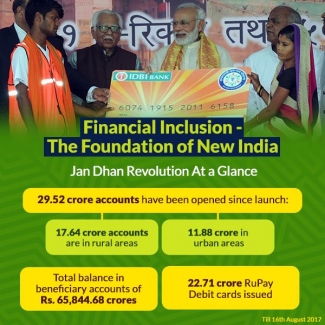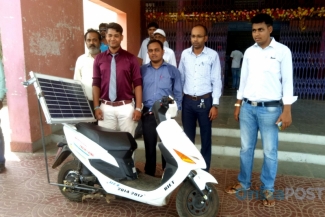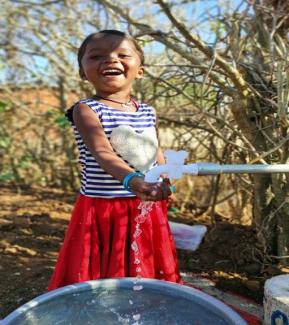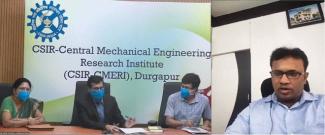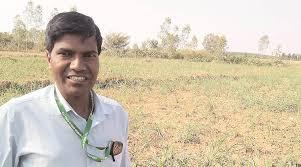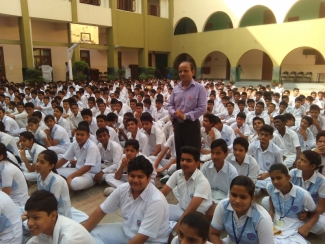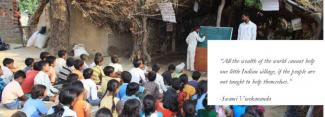
A detailed study has been undertaken by Indian Social Responsibility Network (ISRN) to document and compile Antyodaya based best practices as propounded by Pandit Deendayal Upadhyaya. This is an attempt to bring forth the efforts of all those who are working to uplift the last man in the society. This compilation was done in 2018-19. In this section of the website we are posting work and achievements of some unsung heroes, as documented by ISRN. – Editor
Here is the fourth post of the documented best practices. This post is on the working of Ekal Vidyalaya Abhiyan. It may be noted that as per latest information Ekal Vidyalaya has its presence in more than a lakh of villages. For more information visit www.ekal.org. - Editor
You can also read the earlier posts.
Ekal Vidyalaya shows how to take education to villages. The Ekal Vidyalaya movement conducts evening classes for young children in villages. The classes need no infrastructure and are conducted by volunteers. One village is taught by one teacher teaching moral values and life skills apart from literacy, arithmetic, and basic science. The movement has an impressive reach of 89,000 villages in India.
Great leaps in literacy leave a lot to be desired
India has made considerable progress in educating its masses. Just under 75% of people are now literate. Given the size and the complexity of the population plus the woeful literacy situation at the advent of the independence, this may be considered significant.
However, the quality of instruction to majority of people remains suspect. The Annual Status of Education Report (ASER), 2018 report revealed only 73% of class 8 children can read a 2nd standard textbook and only 44% can solve a three digit by one digit numerical division problem correctly. Of the 260 million students enrolled in schools in 2016-17, at all levels, 49% are in primary schools with only 25% at the upper primary level. A mere 15% , or 39 million, are at the secondary level and just 9.5%, or a little less than 25 million, complete higher secondary.
Poor infrastructure especially in villages explains a bit. Good classroom buildings are almost non existent. Teacher commitment is weak with many classes going without any teachers for days.
The false sense of achievement over literacy achievements hinders the march of the nation more than enables her greatness. A significant non governmental push by dedicated volunteers may lift a lot of literates to the level of education that is needed for a decent living.
Leveraging local youth to uplift their brethren
No one knows the motivations, fears, imperatives, and ethos of a village more than the villager brought up in the village does. A volunteer drawn from the local milieu has the confidence of the people, is accessible, and does not cost a lot. Ekta Vidyalaya has leveraged this truth very effectively to deliver better education to millions of children in tens of thousands of villages.
Ekta Vidyalaya runs evening schools in villages. For three years the schools teach the village children between 6 and 14 years of age, completely free. The typical class has about 30 students. Apart from basic academics, the students are taught in ethics, values, and morals. Mobile cultural centers bring together rural populations through several cultural programs that engage women, youth, tribals, and elders alike.
A school runs three classes in a day. Students are segregated into three divisions on the basis of their knowledge and abilities. The medium of instruction includes text books, plays, games, and music. It covers reading, writing, arithmetic, general knowledge, basic science, health and hygiene awareness, moral education, local sports, craft and creativity.
The schools do not need any building of their own. The classes are sheltered under trees, in the verandas of public buildings, or even the courtyards of local influencers.
Each village has one resident teacher drawn from the same village. Mostly this is a lady who has cleared at least 10th standard. The teacher is trained specially by the organisation.
The schools are managed and monitored by the local Gram Samitis, lending the project community ownership and support. An Ekta Vidyalaya organiser oversees a sub cluster of 10 evening schools. Three sub - clusters each are looked after by a cluster, while an Anchal takes the responsibility of nine clusters or 270 schools.
In 780 schools the organisation has experimented successfully with e-learning. They call it E-Shiksha. Each participating school is given three 10 inch tablets, pre-loaded with custom educational content. The experiment has improved communication skills of the teachers and has markedly improved instruction.
Millions of students. Soon a lac villages Ekal is the largest grass-roots non-government education initiative in India providing free education to more than 2.4 million children.
Ekal has received several awards for its transparency of administration and innovativeness in its operation. It has been awarded the Gandhi Peace Prize for the year 2017, which is the highest honour in any peace initiative in the country. Besides this, Ekal has been awarded Hewlett Packard & India Today “Trailblazer Award” for its digital initiative for the villages.
Prime Minister Shri Narendra Modi exhorted Ekal Vidyalayas to reach one lakh villages by 2022, the year when India will be celebrating 75 years of independence.
And it costs just INR 22,000
Most amazingly, an Ekta Vidyalaya has a total outlay of only INR 22,000 per annum. The strategy of community ownership and local volunteers has certainly worked at keeping the costs unbelievably low.
The organisation raises its funds internationally and nationally. An excellent record at transparency and efficient fund deployment has meant steady flow of donors to the organisation.
Ekal Vidyalaya has shown how massive results may be achieved with just massive commitment
@isrnnewdelhi
isrn.in
K-13, First Floor, South Extension II, New Delhi-110049






